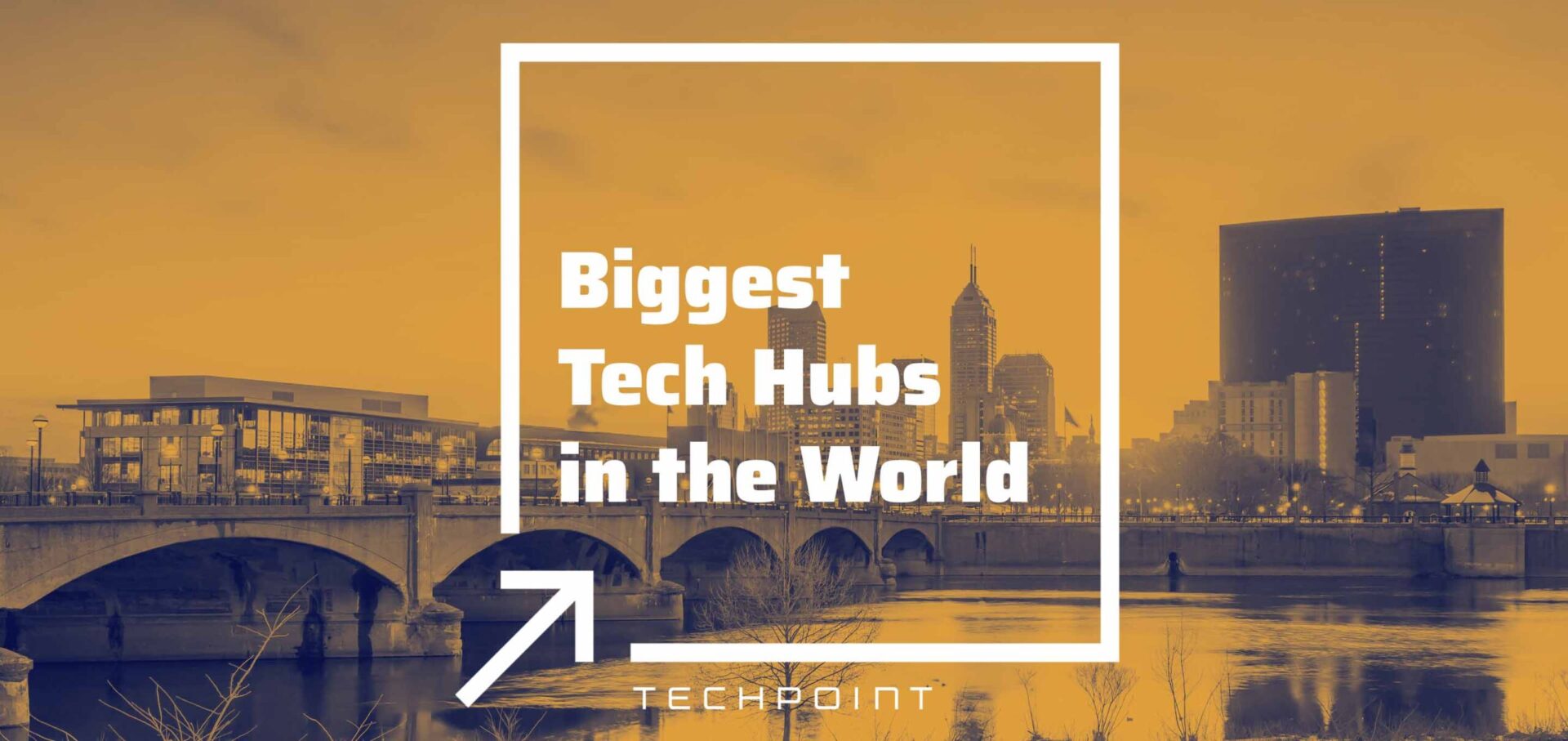The Biggest Tech Hubs in the World & How They’re Changing
For years, Silicon Valley has been seen as the major tech hub in the United States. As tech has continued to thrive as a major industry, more and more tech hubs have emerged as a result of the demand for more great technology solutions. In fact, if you consider transportation, amenities, livability, cost of living, talent pool, and other factors, there are a variety of cities across the US that have become the home of major tech innovations.
It might be surprising to see what cities are emerging and thriving in the tech sector across the US and the world. Let’s take a look at what a tech hub is, the largest tech hubs in the US, and how tech hubs are changing.
Table of contents

What is a Tech Hub?
Everyone knows about Silicon Valley, but what exactly makes it a tech hub? According to Seneca One, a tech hub is a “community that promotes innovation for technology-based companies”. It’s a place where technology talent, investors, educators, and companies can thrive, contributing to a larger tech ecosystem that creates solutions for everyday problems with technology.
Silicon Valley is eclectic, has easy access to a coastline on the north and mountains to the west, has transportation infrastructure, is home to a prestigious university, and accommodates diverse people and cultures. In addition to its affinity for attracting gifted tech talent, all of these qualities were major components to San Francisco becoming the major tech hub it is known as today. Innovation leads to more innovation, which creates a ripple effect and can create growth. The more diverse tech companies you bring to an area, the more diverse the workforce you attract which ultimately drives more new ways of thinking, competitive ideas, and solutions. In turn, the tech community thrives and expands.
However, not all start-ups can afford to move to San Francisco or the surrounding areas, nor is there any physical space left there because of the city’s popularity. Plus, different areas offer different benefits, and not all tech hubs are created the same.

What are the characteristics of a tech hub?
We’ve taken a dive into the biggest tech hubs across the US and where they are emerging. Large cities, of course, top the list as cities that have a large population tend to spark and nurture creativity and innovation. When evaluating these tech hubs, some common threads we’ve noted are:
- Diversity of cities, including talent and expertise
- Walkability and access to bike lanes
- Access to public transportation/rideshare services
- Vibrant cultural scenes
- Restaurants, retail, and amenities
- Access to distribution or travel hubs
Where are the biggest tech hubs? What do they look like? How will they evolve over time? Let’s take a look.

Biggest Tech Hubs in the US.
Many cities have popped up as tech hubs in recent years. Each has its own unique characteristics and plays a special role in the greater tech ecosystem.
Atlanta, Georgia.
Currently, one of the best places to hold a tech job is in Atlanta, Georgia. Atlanta is a large city with a relatively low cost of living (comparatively) with lots of start-ups, a booming tech industry, and most importantly, competitive wages. In 2021 alone, over 100,000 tech jobs were posted, making Atlanta one of the fastest-growing tech cities. On average, tech workers in Atlanta earn a median salary of $95,788 per year. Keep in mind that these workers are in an area where the cost of living is 4% below the national average.As such, Atlanta is often referred to as the “Silicon Valley of the South”.
Atlanta also has easy access to some of the best IT programs in the country, with schools like Georgia Institute of Technology, Morehouse College, Emory University, and Georgia State University just a few miles within the city limits. Since the talent pool is already vast and competitive with so many close colleges and universities, it provides ample research and internship opportunities. This allows the tech hub infrastructure to begin, by building around competitive talent and giving back to the communities, ensuring growth and enrichment. Lastly, it’s only a four-hour drive to the ocean and has plenty of easily accessible suburban getaways close by.

Austin, Texas.
Another popular tech city in the US is Austin, Texas. Austin is one of the tech hubs that is also considered a regional tech hub. Located in the southwest, it’s not near a coast, but it does have the draw of desert hiking and camping. The University of Texas is centrally located downtown and with a booming, enriching music scene and nightlife, Austin is certain to draw a diverse group of innovators and entrepreneurs, especially as one of the most LGBTQ-inclusive cities in the U.S.
Austin, like Atlanta, is considered to have a low cost of living for a large city while maintaining high and competitive wages throughout the tech industry. The median tech salary in Austin is $90,459, and the cost of living 3.4% lower than the national average. Due to Austin’s more afforable cost of living, many companies are making their way to this growing city. The same notable companies who are settling down in Atlanta have already put down roots in Austin as well. Even in 2016, Austin claimed over 161,000 tech jobs with over 6,500 tech companies registered and operating in the city. With the steady population surge in Austin, it’s no suprise that it’s becoming one of the biggest tech hubs in the country. More recently, Tesla even moved its headquarters from Silicon Valley (Palo Alto, CA) to Austin.

Emerging Tech Hubs.
Miami and Tampa have also emerged as tech hubs. Both of these southeastern cities are located on waterfronts on opposite ends of the Florida Peninsula. However, being less than 300 miles apart allows a lot of room for expansion. A key factor for Miami is its Black and LatinX tech talent and entrepreneurs; it’s viewed as a strategic entry point with secure banking options, lower taxes, good weather, and good quality of life. Focusing on flexible and remote working conditions, south Florida is expected to grow in the tech sector over the next several years.
As the tech industry continues to expand and become integrated into the landscape of our economies, the need for tech hubs isn’t going to disappear, but the demand to keep up is already a struggle. Large cities up and down the east coast all have viable and stable tech bases. Boston, for example, has a successful tech industry with a large emergence of startups, plus a huge pool of talent to choose from with so many colleges and universities nearby. However, the cost of living is higher and there isn’t a lot of room for expansion. Much of the same can be said about Philadelphia and Washington, D.C. as well. Places like Raleigh, North Carolina and Columbia, South Carolina are also beginning to see growth due to entrepreneurship and tax incentives.

Emerging Tech Hubs in the Midwest.
Places like Chicago and Detroit are noted on all “emerging tech hub” lists, but their cadence of growth is less explosive. Chicago has consistently held extensive opportunities in tech and IT while maintaining a lower cost of living than the coasts and providing the amenities that most tech hubs typically want.
Detroit recently joined the ranks of creating a tech sector and has created over 180,000 tech jobs, but the average salary isn’t quite able to compete with the previously noted tech hubs. While the Midwest may not have the draw of the coastline or the bustle of the big city, the opportunity to become a regional hub with the possibility of expansion, coupled with greatly slashed cost of living prices, is priming the stage for an inevitable boom.
DEI’s Role in Successful Tech Hubs.
The movement in these midwestern and region-type tech hubs intersects with where Black and people of color are most likely to find success in their business and are able to close the racial wealth gap. It’s no coincidence that the emerging tech hubs and cities of the US are even carving space and incentives to draw those Black business owners and entrepreneurs. Many of these incentives are being directed specifically toward the tech industry. Indianapolis’s own nonprofit, Be Nimble Foundation, has even allocated set funds specifically for black tech innovators, tech companies and grants for black entrepreneurs.
The future of tech careers, tech jobs, and creating a tech hub starts by leveling the playing field for all who want to participate and by allocating funds to help bridge that gap for traditionally underserved communities. As one of the tech hubs in the Midwest, Indianapolis has worked hard to close that gap more and more, and there is still an opportunity for even more improvement. A recent talent report shows the state’s averages are below the national numbers for Black and LatinX employment and long-term losses for not improving these numbers will significantly hurt the workforce, the communities, and the prospect of attracting more talent.
As a result, TechPoint is working with the Indiana tech ecosystem to activate a skills-based hiring movement and establish inclusive educational pathways for the top tech careers to ensure that the region has ample, top tech talent to address the workforce needs of the future. Similar priorities have been set in Detroit and Baltimore, proving the necessity of diversifying your tech workforce.
In recent years, US. tech companies have made an effort to prioritize DEI, but as the industry continues to struggle with over-hiring since 2020 and hefty interest rates, many tech companies have decided to move forward with layoffs. These layoffs only further disrupt the diversity pledges that are growing stagnant as companies de-prioritize DEI efforts. More so, women and Latino workers represent 46.64% and 11.49%, respectively, of the tech layoffs from September to December 2022, while those segments make up 39.09% and 9.96%, respectively, of the whole industry.

Indianapolis’s Role as a Tech Hub.
Indianapolis has made huge strides as a midwestern tech hub with a low cost of living, being at a strategic crossroads, attracting a wealth of manufacturing and logistics companies, adding amenities every year, having great public and private universities, and much, much more. In addition, more and more venture capital firms have established themselves in the state to invest in emerging companies and talent, and TechPoint’s own Relationship Management is attracting more headquarters for existing tech companies to the state. While we might not have some of the amenities some of the coastal or big cities do, there is no question that Indianapolis has solid footing in the greater tech ecosystem.
No matter where the tech hubs are located, many are focused on cultivating the same things: a diverse and inclusive workforce, access to funding, livability, transportation, room for expansion, access to distribution, and much more. Without these attributes, they wouldn’t be able to survive.

Hybrid and Remote Work and How Tech Hubs are Changing.
Even with over three years of remote work under everyone’s belts, the idea of getting rid of geo-centric tech hubs seems highly unlikely, even though the concept is changing. Many large companies (tech and otherwise) took this as an opportunity to move offices or even create satellite offices. For instance, Tesla bought property in Texas and Salesforce has offices in Tampa as well as Indianapolis (amongst other locations). Realistically, these powerhouse companies, alongside Google, Microsoft, Amazon, and others are evaluating where they want to have real estate investments and are not canceling in-person work entirely. Instead, they are potentially investing in more locations, in more infrastructure, and most importantly, in places where diverse talent pools are present.
Work culture is an important aspect in any industry, but it plays an even more important role in industries that require a lot of innovation like tech. Acclimating to remote work-life is something the pandemic pushed on the tech industry faster than anyone ever anticipated. Many companies are finding that being fully remote can have an impact on innovation and collaboration. Larger, established companies have begun to implement the use of satellite offices as a way to save money and spread their reach geographically. A built-in benefit to these kinds of satellite offices is likely a more flexible work schedule. Depending on the role in the company, coming into the office could be as little as once a month. This is another way the forced tech hubs expansion has adapted to meet the demands of the workforce. The bottom line is that there will always be a need for a physical place to meet, collaborate, and innovate, but more spread-out locations are favored over one, large, central location.
While we are seeing a surge of tech hubs and tech cities booming with so many local and federal aid and assistance programs to encourage tech growth, there will be a limit. Not every city can be a tech hub, but more and more cities will be critical to the bigger ecosystem. Large tech companies will likely continue to spread and have smaller offices throughout the major cities, allowing talent the option to work remotely while still being near a home base for necessary check-ins.
The decision between remote work versus working on-site at an office will always be up for debate, but hybrid work seems to be the proper compromise for tech companies scouting out the talent pool. Especially for recent college graduates who completed their education online and at home, they are accustomed to remote work and prefer it as they embark on their job hunt. Even prior to the pandemic, a 2019 poll found 83% of workers said flexible work options would help them decide between two job offers. A 2022 LinkedIn poll found that more than half of 32,000 respondents would decline a job offer if the company didn’t permit remote work.
Hybrid work combines the benefits of working from home with working in an office, making it the new norm for many tech companies that can’t fully convert their staff back into being at the office full-time. One of the main benefits of hybrid work is the flexibility and autonomy it provides between the two working models. More so, hybrid work enables diversity and inclusion by embracing different styles of work and collaboration. In fact, Gartner forecasts that 39% of global knowledge workers will work hybrid by the end of 2023.

Biggest Tech Hubs in the World.
When we compare the biggest tech hubs in the US, we automatically stack them up against San Francisco, but what about beyond the continental US, what other cities or countries are leading the way in tech innovation? Without a doubt, Tel Aviv, Israel comes first to mind, housing over 6,000 start ups . In 2022, Tel Aviv-based start-ups raised $6.9 billion in venture capital funding, ranking it as the third largest tech hub in terms of venture capital investments.
Tel Aviv could not be such a thriving world tech hub if it wasn’t for community support and in turn, what they give back. With that said, most Israeli startups receive government funding in exchange for military enlistment/duty. This commitment to the military also comes along with extensive technical training and education, giving their workforce the skill sets needed to prepare for a tech career and making them highly competitive and ambitious. Tel Aviv is a working example of how a tech hub supports the communities in which it’s involved and where everyone reaps the benefits of having their city involved.
Aside from previously mentioned US cities, London, Beijing, and Shanghai round out the list of world tech hubs. In London, there is easy access to tech talent with nearby universities and colleges, as well as being in the heart of the city. London, known for being a culturally diverse city has a built-in benefit, but the cost of living is what makes this city a hard sell. With US companies like Microsoft, Google, and Amazon having already claimed real estate in this tech hub, it’s positioned itself well as a tech hub in Europe.
China has big plans in motion behind its international tech hubs with the support it channels to Beijing and Shanghai. Not only are they investing large amounts of capital, but also future science and technology innovation centers are planned as expansion and support features to their already booming tech hubs. China is dedicating significant funds and support to tech; even the Mayor of Beijing stated the goal for growth is high. He wants to see Beijing fully supporting 10,000 tech companies by 2025, and he thinks it’s possible. While both cities are large and bustling, boasting lively cultural delights, Shanghai has the draw of the warmer, coastal climate and Beijing has the appeal of the winter and mountains nearby.

Tech Hub, Redefined.
Over the past threeyears, there has been a lot of movement in regard to relocating businesses and relocating people. Space has become paramount, but not in the traditional office sense. The workforce decided space for living was more important than not having a commute, and going to the office became less necessary since we can now communicate and collaborate with video conferencing. As we look at how tech careers are growing and what to do to best shape our economy to prepare for these jobs and this industry, the logical response is to level up and get ready to grow. The talent pool has made it clear they want flexibility and they want competitive pay. Working to establish a tech hub is going to help all businesses offer these benefits to a diverse field of candidates and top-tier businesses. Investing in your tech community now is as imperative as it will ever be.
Want to get a better picture of how your business will grow in Indiana? TechPoint can connect with the Indiana Economic Development Corporation (IEDC) to develop a plan for your business’s specific needs. Contact our Relationship Management team at growindy@techpoint.org.




